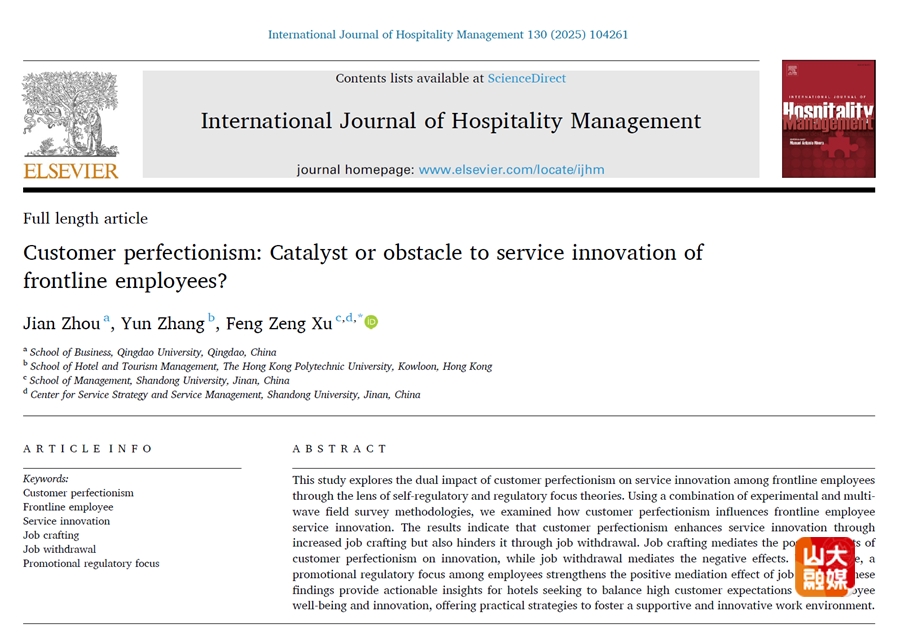Recently, Professor Xu Fengzeng from the School of Management, Shandong University, in collaboration with Professor Zhou Jian from the Business School of Qingdao University and Zhang Yun from the School of Hotel and Tourism Management at The Hong Kong Polytechnic University, has published a research article titled “Customer Perfectionism: Catalyst or Obstacle to Service Innovation of Frontline Employees?” in the International Journal of Hospitality Management (ABS 3, JCR Q1, Impact Factor: 10.0). Xu is the corresponding author, and Shandong University is the sole corresponding institution.

In the service industry, customers’ high standards and perfectionist demands can either stimulate employees’ creativity or bring about stress and withdrawal. The study was the first to systematically unveil the dual-edged mechanism of customer perfectionism on service innovation. Through rigorous experimental design and multi-phase field surveys, it was found that customers’ perfectionist demands influence frontline employees’ service innovation through two opposing pathways: on one hand, they significantly promote employees’ proactive optimization of work methods (job crafting), thereby enhancing innovation performance; on the other hand, they may also trigger passive avoidance behaviors (job withdrawal), reducing innovation effectiveness. The finding was particularly crucial for China’s service industry, which is at a critical juncture of transformation and upgrading. With the growth of consumption upgrading and personalized demands, balancing customers’ increasingly high service expectations with employees’ innovative drive has become a core challenge for the industry’s sustainable development.
Furthermore, the study specifically pointed out that employees with a proactive orientation (promotional regulatory focus) are more capable of transforming high standards into innovation opportunities. This provided a scientific basis for the hotel industry to maintain employee well-being while meeting customers’ high expectations. It is recommended that enterprises create a work environment that balances service quality and employee creativity through empowerment support, psychological counseling, and targeted training.
Xu Fengzeng is a Professor and Doctoral Supervisor at the School of Management, Shandong University, and Director of the Research Center for Service Strategy and Management. He also serves as Vice President of the Shandong Society for Innovation and Development in Philosophy and Social Sciences, Research Fellow at the Institute of National Governance, Shandong University, and Standing Member of the Expert Committee on Agricultural Socialized Services in China. In addition, he is recognized as a Young and Middle-Aged Expert in Tourism in Shandong Province, a Consultant Expert of the Shandong Boutique Tourism Promotion Association, and a Consultant of the Shandong Rural Tourism Association. He is also a peer reviewer for the National Natural Science Foundation of China (NSFC) and the National Social Science Fund of China (NSSFC). His research interests include tourism and hospitality development, common prosperity and rural revitalization, digital service innovation, and entrepreneurship in tourism. He has presided over more than ten national-level research projects, including key projects funded by the National Social Science Fund of China and general projects funded by the National Natural Science Foundation of China. His work has been published in leading academic journals such as Management World, Tourism Management, International Journal of Hospitality Management, and International Journal of Contemporary Hospitality Management.